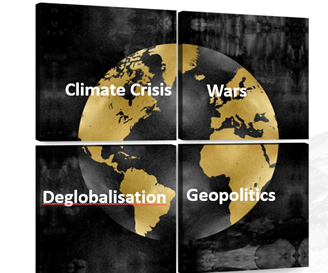The world order of food is changing… and changing fast
- Like
- Digg
- Del
- Tumblr
- VKontakte
- Buffer
- Love This
- Odnoklassniki
- Meneame
- Blogger
- Amazon
- Yahoo Mail
- Gmail
- AOL
- Newsvine
- HackerNews
- Evernote
- MySpace
- Mail.ru
- Viadeo
- Line
- Comments
- Yummly
- SMS
- Viber
- Telegram
- Subscribe
- Skype
- Facebook Messenger
- Kakao
- LiveJournal
- Yammer
- Edgar
- Fintel
- Mix
- Instapaper
- Copy Link
Posted: 11 October 2023 | Professor Chris Elliott | No comments yet
Professor Chris Elliott explains why he thinks the geopolitical landscape might drastically alter the current food system.


There have been growing discussions and concerns about global food security over recent years nationally and internationally. The ever-increasing impacts of our climate crisis are becoming better understood, with much evidence being produced about the effects it will have on our efforts to provide safe and nutritious food for all.
The shocks caused to the world food supply system by the invasion of Ukraine by Russia have wreaked havoc in many places, but especially in the poorest countries in the world that depend on humanitarian aid. The third big factor to be concerned about is the movement towards deglobalization as I wrote in my last article for New Food.
But I believe there is a fourth very large and seldom talked about factor that will also have a massive impact on global food security going forward. Several years ago the phrase ‘food is the new oil’ started to appear. There are few that have not heard of OPEC – the organisation has huge influence in the price of oil worldwide – but for food I believe it will be BRICS+ that will have the same power for food going forward.
For those not familiar with what BRICS is; it’s the grouping of Brazil, Russia, India, China, and South Africa formed by the 2010 inclusion of South Africa to its predecessor BRIC. By 2018, the gross agricultural production of BRICS accounted for over 50 percent of the world’s total despite being only including 40% of the world’s population. Overall as a trading block they have realized food security as a whole, but the self-sufficiency rate varies between different countries and for different types of foods. Another important fact is that the BRICS countries produce many different types of foods and there is a substantial effort to have high level trade agreements in place that will mean exports and imports between BRIC countries will increase substantially. Clearly this will have a substantial impact of availability of food outside of the trading block.


Are we missing a fourth compenent to the global food security puzzle?
A very recent and important announcement was that BRICS members will expand to 11 countries with the inclusion of Iran, Saudi Arabia, Egypt, Argentina, the UAE and Ethiopia. Xi Jinping, the president of China, described this expansion as being “historic” and will be a major vehicle for the Global South to have a much stronger voice in world affairs.
Personally, I don’t think enough attention has been paid to the ever-growing strength and influence BRICS+ will have on global food security. To my mind, we need to add this development to the other three important topics I outlined at the start of this article to allow strategies to be developed for national food security. I think the dynamic around Africa’s role in producing much more food is outstanding and may well address huge inequalities that have existed for generations – inequalities the developed world has failed to address properly.
The four big drivers of change to our global food system are inextricably linked, and there will be some global regions that will be impacted much more than others, both in positive and negative ways.
Related topics
Food Security, Supply chain, Sustainability, Trade & Economy, World Food









